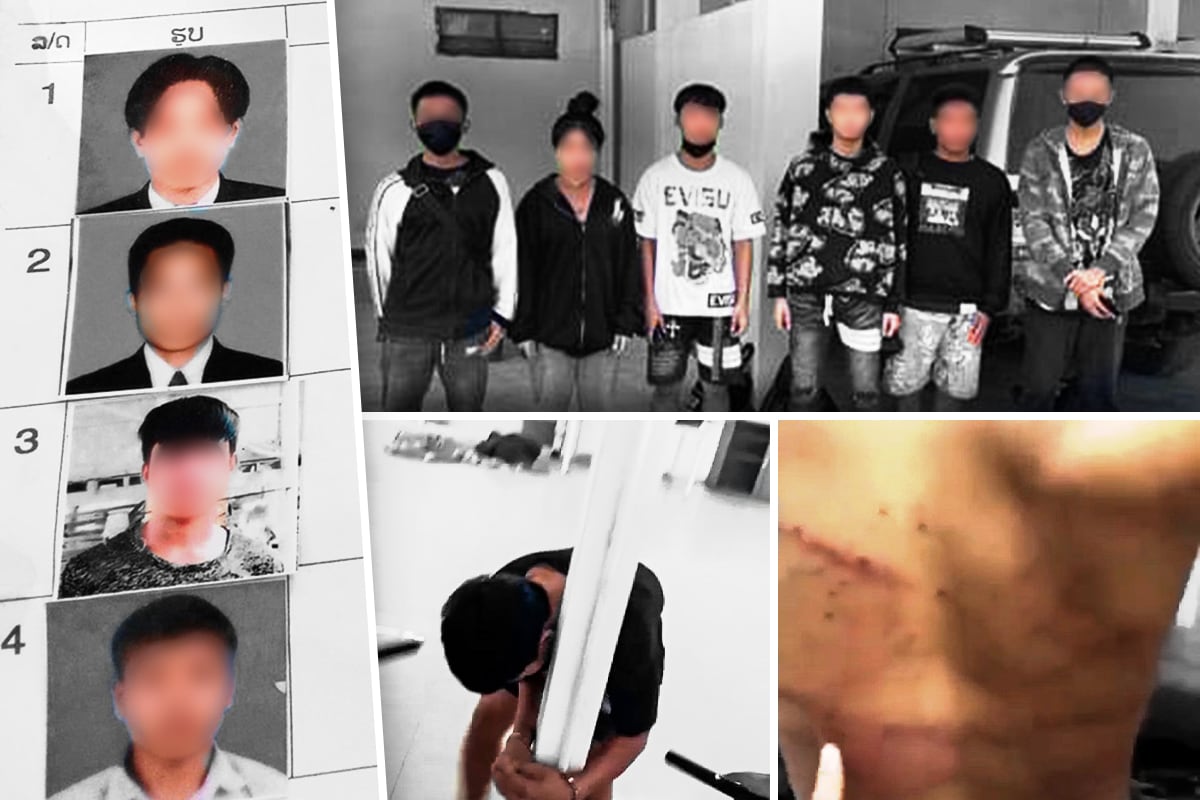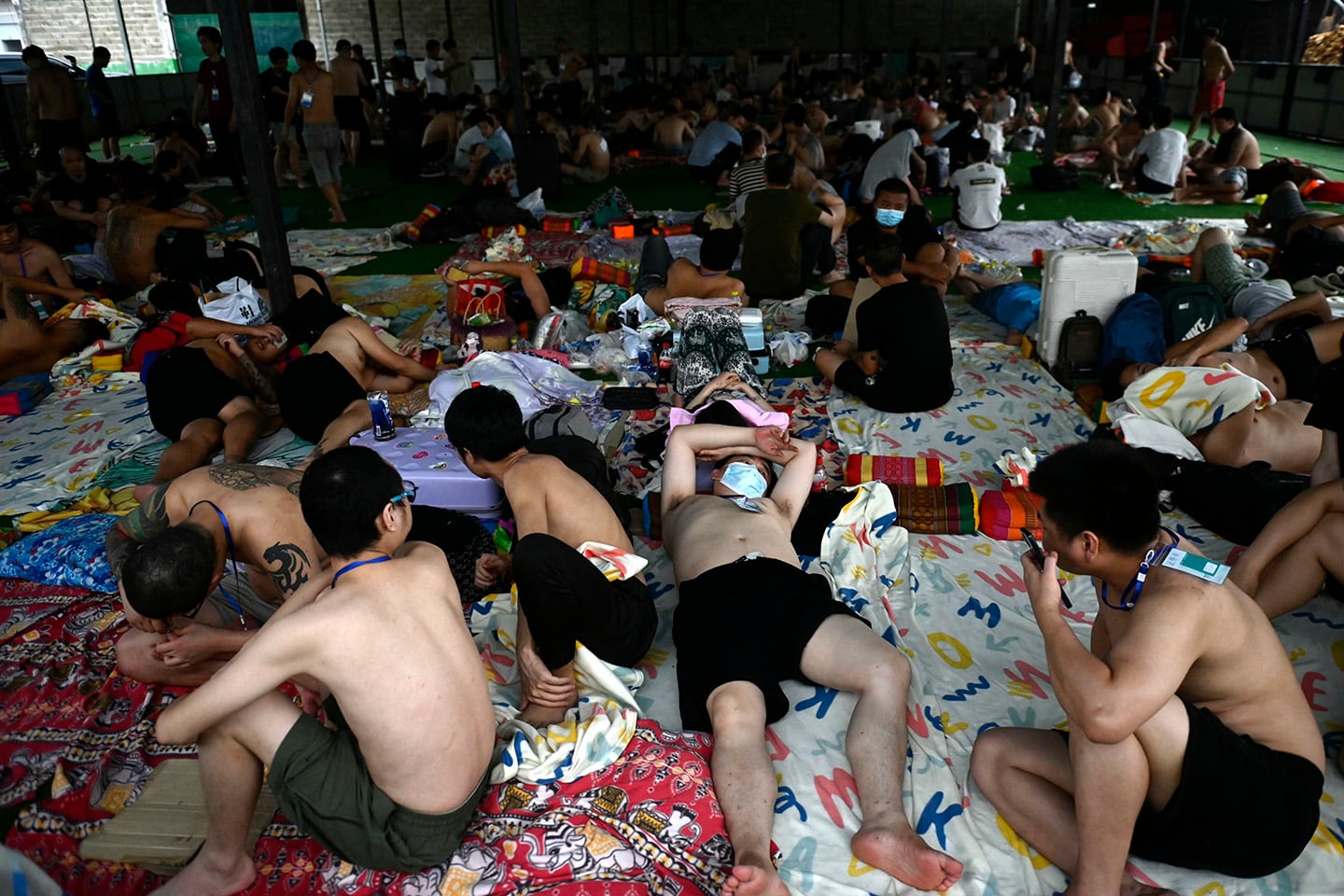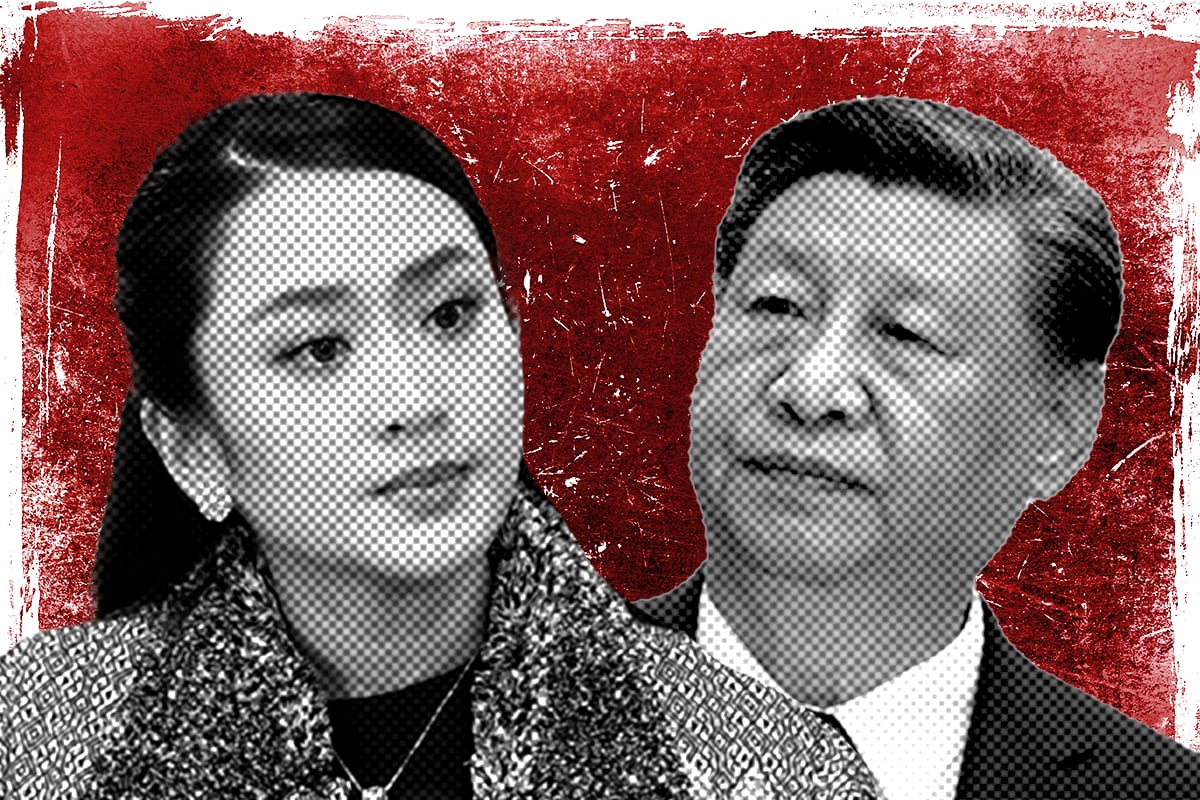Read reporting on this topic in Vietnamese here.
Many weeks after they were rescued from scam centers inside Myanmar, more than 200 Vietnamese workers are still stranded in a squalid camp near the Thai border because they can’t afford their passage home, two of the workers told Radio Free Asia.
“Life here is very hard. The accommodation is like a chicken coop. You have to sleep on the floor on mats,” said a 31-year-old woman from the northern Vietnamese province of Son La, adding that conditions were “miserable” and infections spread among people there.
Hundreds of Vietnamese were among the more than 8,000 people of various nationalities who were freed in February by a pro-junta Myanmar militia that hosted extensive online fraud operations in its territory on the Thai-Myanmar border.
The Karen National Army, or KNA, let them go after unprecedented pressure from governments, including China, over criminal activity in the militia’s area including forced labor and torture of workers, and fraud against the targets of cyber scams.
Freed workers were taken to a makeshift camp near Myawaddy, the main international border crossing point to Thailand, to await repatriation. While the majority of those freed were Chinese, the Karen force said they included 685 Vietnamese.
On May 15, Vietnam confirmed that it had repatriated a total of 450 citizens from Myanmar, and about 200 were still waiting to return. Stranded workers told RFA there were 215 Vietnamese left, and the KNA said 214.
Those still left behind are increasingly sore about it.
“I am very disappointed,” the Son La woman said. “Even Ethiopians, the poorest people here, were allowed to return home, leaving only over 200 Vietnamese people still here.”
People have to pay
RFA spoke directly to two of the Vietnamese workers. Others were within earshot of the call at the camp. They all said that they have to pay money to their embassy to be repatriated - money they don’t have. All requested anonymity for safety reasons.
“At first, you only had to pay 10 million (dong) ($385), but the longer you stay, the higher it gets. Now it’s 12 million ($470), and some people have to pay 13 million $500),” a Vietnamese man in the camp told RFA.
He said he was instructed by a representative of the Vietnamese Embassy in Bangkok on how to pay to be on the repatriation list.
He showed RFA the contents of a text message exchange with that official via the messaging app Zalo. In it, the official explained that the amount of “more than 12 million (dong)” was to buy a plane ticket, and if there was money left over it would be returned to the family.
“To be honest, I can’t afford to pay because my family is very poor. My family also asked me why I have to pay for the rescue?” the man told RFA.
The woman told RFA that she was also asked to pay money if she wanted to return home. “People from the Vietnamese Embassy in Thailand said it would cost money, and if you don’t pay, you won’t be able to return,” she said.
RFA contacted the Vietnamese embassies in Myanmar and Thailand to verify the above information but received no response.
The revelation that the Vietnamese scam center workers have to pay for their passage home may raise awkward questions about the Vietnamese Ministry of Foreign Affairs’ handling of the situation.
Past problems with repatriations
The ministry and other Vietnamese government agencies have courted controversy in the past over officials skimming repatriation funds. In 2023, a Hanoi court convicted 54 defendants, including senior diplomats, for collecting over $7.4 billion in bribes to arrange government flights home for Vietnamese citizens stranded overseas during COVID pandemic lockdowns during 2020 and 2021.
While this repatriation operation is far smaller in scale, the scam centers have been headline news, shining a spotlight on the plight of those caught up in huge fraud operations in lawless regions of Southeast Asia. These centers are often staffed by people lured by false job advertisements and forced to work, sometimes under threat of violence, rescued workers and rights groups say.
The scamming, known as “pig butchering” in China, involves making contact with unsuspecting people online, building a relationship with them and then defrauding them. Researchers say billions of dollars have been stolen this way from victims around the world.
The Vietnamese man said he had arrived in Thailand in 2023 to take up another job but was forced to cross the border into Myanmar to work in a Chinese scam center to target Vietnamese people. He said if he did not achieve monthly targets, he would be tortured.
The woman from Son La told a similar story. She got a job as a translator in Chiang Mai in northern Thailand in September 2024 but was then forced at gunpoint by her employers to cross the border into Myanmar to work in a scam center.
She said that after that she had tried to contact the Vietnamese Embassy in Myanmar for help but received no response, and started to plan an escape with other women from India and Indonesia. Their plan was exposed, and she was then locked in a separate room by her Chinese employers for two months as punishment. In April 2025, she was taken to the border camp by the Karen militia.
US sanctions
Despite the KNA’s apparent efforts to show it is untangling itself from the scam industry, on May 5, the U.S. Treasury Department blacklisted the ethnic army, its leader Saw Chit Thu and his two sons for facilitating cyber scams from territory they control on the Thai-Myanmar border. The KNA was designated as a “significant transnational criminal organization” that is barred from holding property in the United States and conducting transactions with U.S. persons.
On May 6, Lt. Col. Naing Maung Zaw, a spokesperson for the KNA, told The Associated Press 7,454 of 8,575 foreign scam workers have so far been repatriated through Thailand. He said more than 10,000 people remained to be identified in the KNA-controlled areas, and the group would continue to work toward the elimination of scam activities.
Speaking to RFA last week, Naing Maung Zaw said they do not have a direct communication channel with the Vietnamese government and have noticed that recently Vietnam has reduced the repatriation of its citizens. He said he wasn’t aware those stuck at the camp have to pay money to the Vietnamese government to be repatriated.
“Now that RFA has mentioned it, I will pay attention to this issue. I will meet the Vietnamese people tomorrow and ask them directly if this is true. If it is true, we will report it to our superiors and do something,” he said.
Vietnamese Ministry of Foreign Affairs spokesperson Pham Thu Hang told reporters in Hanoi on May 15 that the ministry will direct Vietnamese representative agencies in Myanmar and Thailand to bring the remaining Vietnamese citizens home as soon as possible.
Edited by Mat Pennington.



